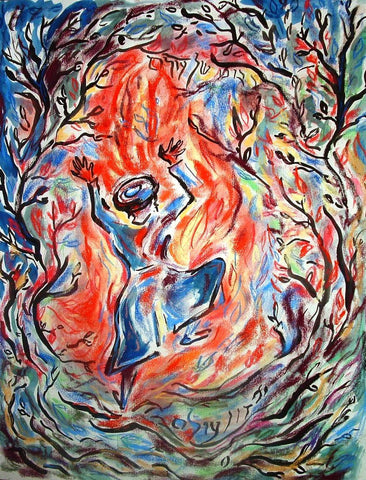My first year in college, I was dubbed the 'singing freshman', because I used to regularly and vocally sing as I walked around campus. Some people looked at me askance but I always wondered why they weren't singing. I never thought my non-conventional self expression would connect me to Hasidic Judaism until I encountered the teachings of Rabbi Israel ben Eliezer a.k.a the Baal Shem Tov (which means Master of the Good Name).

The Baal Shem Tov was a Jewish mystic and teacher who lived in the late 17th and early 18th century Ukraine who revolutionized Eastern European Jewish culture and changed the course of Jewish history. He founded what is now called the 'Hasidic' movement and taught God could be known not just by the elite, but by all people through 'serving God with joy'. That ordinary mundane life could be revealed as sacred and awesome through 'raising the sparks' of our everyday actions with Godly intention. A 'Hasid' was someone who went beyond the letter of the law and lived life fully. Part of his practice was a form of ecstatic singing meditation that would bring the singer to a state of 'dvekut' (union with God). He taught “Through music...you can reach joy and dvekut with the Infitite One, blessed be He.” These sacred melodies called 'niggunim' were and still are sung around Shabbat tables, and at other sacred gatherings around the world.
This niggun called Shalosh Tinuous (which means the three stanzas), is one of the most famous Hasidic niggunim. The first stanza was composed by the Baal Shem Tov, the second by his student and succesor Rabbi Shmuel Dov Ber known as 'The Maggid', and the third stanza by Rabbi Shneur Zalman of Liadi, a student of the 'Maggid', who founded the Lubavitch movement.
Ecstatic music has always been a part of Jewish spiritual practice. The Book of Samuel describes that part of King Saul's transformation from an ordinary man into a king was that he would “meet a band of prophets coming down from a high place with a lute, a drum, a pipe, and a lyre before them; and they shall prophecy: and the spirit of the Lord will come upon you, and you shall prophecy with them, and shall be turned into another man.” When I get deep enough into a niggun, all my thoughts settle and quiet down, and it feels like I am no longer singing the niggun, rather the niggun is singing me and it feels like my Godly soul is singing through me.
Hasidic art by: Shoshannah Brombacher - www.absolutearts.com/
